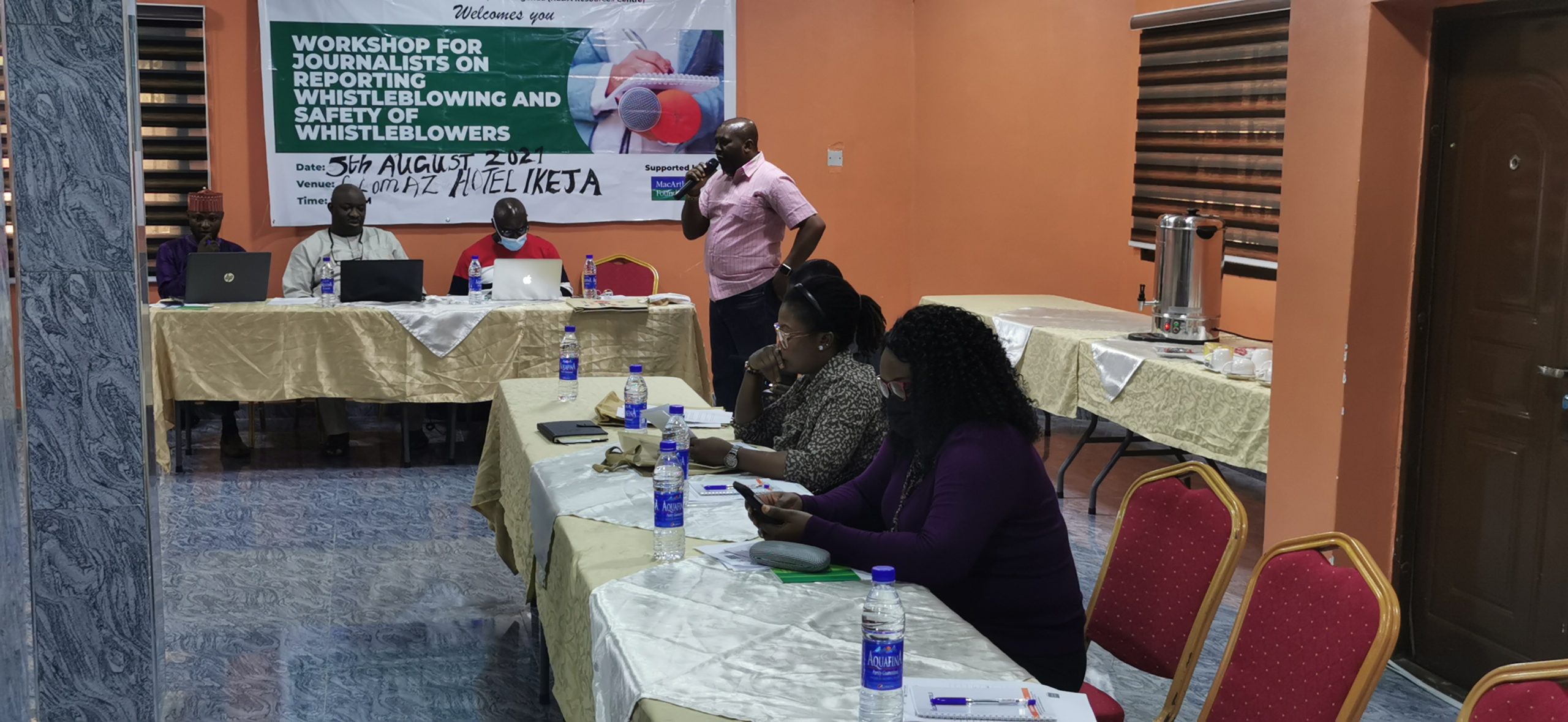By Doyin Ojosipe
In a bid to expand the knowledge of journalists on whistleblowing and ensure protection for citizens who dare to blow the whistle, the African Centre for Media and Information Literacy (AFRICMIL), in collaboration with the Human and Environmental Development Agenda (HEDA) has organized a workshop on whistleblowing and whistleblower protection for a select group of journalists in Lagos.
This training was against the backdrop of consistent reprisals suffered by whistleblowers amidst the lack of legal framework in support of the whistleblowing policy declared by the Federal Government in 2016.
In his opening remarks, Chido Onumah, Coordinator of AFRICMIL who was represented by the organisation’s Program Manager, Kola Ogunbiyi said, in as much as the training was meant to support whistleblowers, it was also intended to benefit the journalists who by virtue of their profession are whistleblowers.
“AFRICMIL believes that by the nature of their job, journalists are also whistleblowers and should have as much stake as other agencies in not only entrenching the culture of speaking up against wrongdoing, but also in the practice of standing up for anyone facing reprisals,” he said.
Speaking on the state of whistleblowing in Nigeria, the Chairman, HEDA Olanrewaju Suraj, represented by his organization’s Program Manager, Ridwan Sulaimon, said a network of whistleblowing Journalists was very much needed given the fact that the policy was not comprehensive enough.
Recounting the scenarios of Ntia Thomson and other whistleblowers who had suffered reprisals, Sulaimon noted that the policy was already marred by irregularities and distrusts.
He added that the initial approach was inadequate as it was more fixated on cash rewards rather than making citizens see the need to expose corruption for their common good.
“CSOs and journalists need to increase citizen awareness and partnership on whistleblowing so as to highlight the stature of non-state actors; this can help in keeping the government and other state actors in check, knowing that the people are at alert,” he said.
In the same vein, Lanre Arogundade, Executive Director at the International Press Centre (IPC), who lectured the journalists on ‘reporting whistleblowing and safety of whistleblowers,’ said that the ultimate goal of whistleblowing is to protect the interest of the public by informing people or organization’s that are in a position to prevent harm, to investigate or to take action against those responsible for wrongdoing.
He however said that, “existing legal provisions are fragmented and weakly enforced in most jurisdictions. Only in rare cases do they provide sufficient protection for whistleblowers. Many laws may cover only the public sector or may be not tailored to the specific needs of whistleblowers.”
On how to protect the whistleblowers, Arogundade reiterated the need for journalists to know what was at stake at a given time and to always cover their sources as they may be faced with the danger of reprisals.
In a call to action, Edetaen Ojo, the Executive Director of Media Right Agenda in his presentation assured the journalists of civil society collaborations as far as their safety and that of whistleblowers were concerned.
“When you run into problem because you might run into problem from time to time, when people are trying to find out who your source was, if you have a support network behind you, those sort of battles are easier to fight than if you are fighting them alone and trust me, your employer may not always be there.
“Sometimes, depending on who you work for, they may be politician or business person who are leveraging on the influence of the media but your professional colleagues who share an understanding of your challenges are more likely to amplify your situation so there are many reasons to belong to a network.
The workshop which was attended by 10 journalists in Lagos on Thursday, was also graced by Jaafar Jaafar, an embattled whistleblower and a journalist, who joined the event through google meet to make his contributions.
Narrating his ordeal in a bid to express the fraud committed by Kano State Governor, Abdullah Ganduje, the embattled Journalist said he had to flee the country as he feared for his safety.
The media training was an activity under the whistleblowing project of the AFRICMIL, tagged Corruption Anonymous.
The project is sponsored by the John D and Catherine T MacArthur Foundation.



